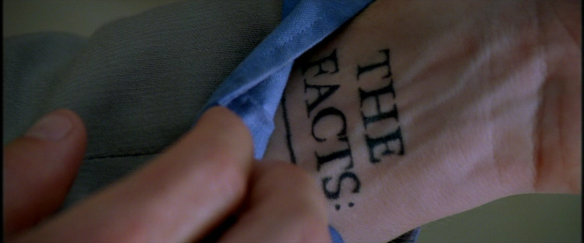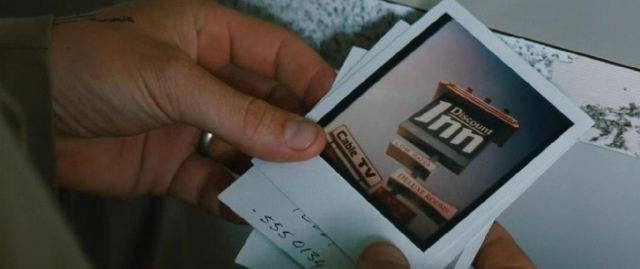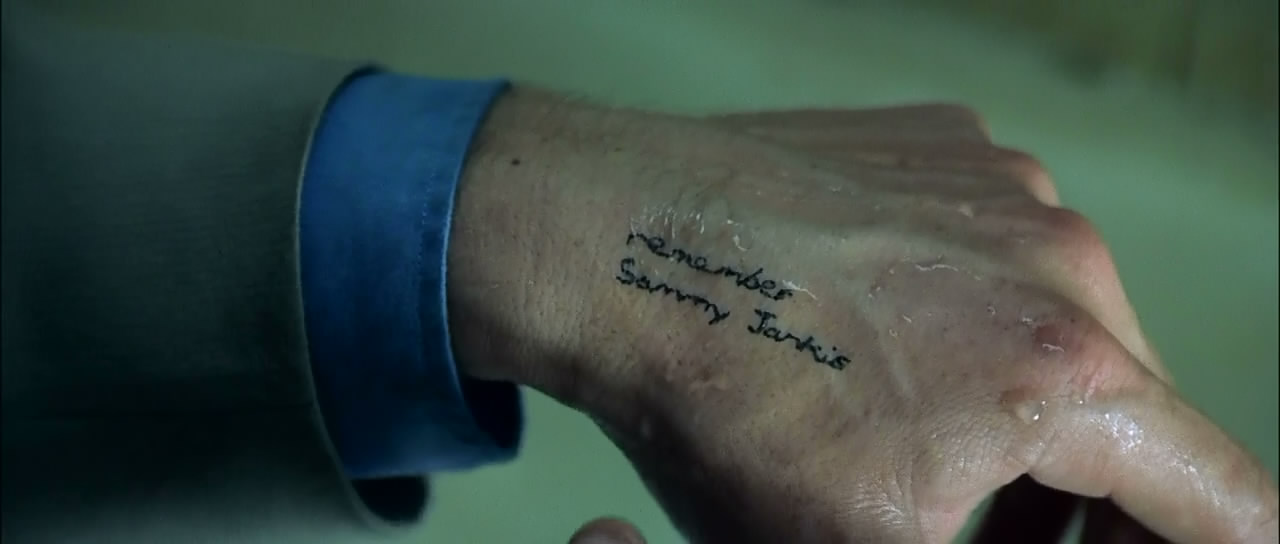Christopher Nolan’s Memento: A Philosophical Consciousness Debate

Plot Summary (Warning: Contains Spoilers)
Memento tells the story of a hopelessly enraged man who is looking for the person who raped and murdered his wife. However, Lenny forgets who he is periodically and can not create and form lasting new memories anymore as a result of a traumatic head injury that occurred just before his wife’s attack. The catch is: yes someone attacked his wife, no she was not murdered during the attack and nor was she murdered in the true sense of the word. Throughout the film, Lenny searches for answers with the help and perhaps misdirection of a few other interesting characters. He embarks on a journey of self reflection and duty, learning that in the end most times it is human nature to shield yourself from the horror of real, untainted truth.
How Philosophy relates to Fiction
John Locke was and English philosopher and physician that lived in the 1600s and died in the early 1700s. Locke mainly prescribed to the idea of persistence of mind translating as a untiring identity. The specific Locke ideal states “consciousness makes personal identity”, basically saying that a persistent form of consciousness and a repeated act of being conscious is what proves that our personal identity is in existence. If it would make logical sense that one may be able to maintain an undeviating habit of mind than they therefore subsist as a personalized and singular entity. This entity where the consciousness follows an itemized format and furthermore creates a recognizable identity to the person, oneself or others. A “pattern of self” could potentially be perceived as a pinpointed perspective that is linked only to the ability to sustain a recurring memory and sense of comprehensive identity. Although, identity is not just substance based, it can also manifest in the consciousness or even the subconsciousness but its perseverance is continual. For the most part, it could be said the identity remains intact even when it faces times of strife, minute or colossal disruption.
Is Lenny still Lenny: Is he considered a person?
These theories directly apply to Lenny or Leonard in the Christopher Nolan’s Memento. Even though Lenny’s consciousness is interrupted by periods of inability to know when and where he is, he sustains a want and or unchanging desire to create a puzzle for himself. When he does, on occasion, regain small portions of complete consciousness of his reality he recreates the mystery all over again. A further example of Lenny still securing and keeping his sense of identity even with the constant remembering and forgetting of present moments. His personal identity continues to show up in his starkly intelligent, diabolical mind and in his obviously deliberate steps taken to forget these things about his past life in future ‘freshly formed’ realities to come.

A direct example of his enduring personality is the repeating of his mantra, “Remember Sammy Jankis” according to his hand tattoo. Yet, even among the enigmatic farce he periodically reforms, Lenny manages to remember his past life in moments of clarity. In such moments he proves his consciousness and identity all together. Even with the troubling condition that his short-term memory suffers, it is clear he remembers things in his long-term memory and he has absolutely no problem recalling the details of what has happened long ago. He remembers that his wife had diabetes, he remembers giving her shots and he remembers the accident that caused him to have memory loss as severe as Sammy’s. Sammy’s loss is so close to what he lost. Why is it then that he has trouble distinguishing himself from the narrative he then tells himself and does that prove a break in conscious identity?

Sammy vs. Lenny: Long Term Memory Proves Identity

To people in the audience that claim he may not remember the accidental killing of his wife, then how is it that he does indeed remember the specifications Sammy Jankis’ life? It is because his persisting personality is able to confuse himself into thinking Sammy is a different person than he is. Although there are undeniable similarities in his life story to Sammy’s story, the permanence of his high intellect gives him the unchanging ability to plant artificial lineage to circumstance and alter the way he originally concludes the outcome of events. Especially because he proves time and time again throughout the movie to have a superior form of intelligence and tenacity these links would be too obvious for a brilliant mind like his to overlook. His overwhelming desire to investigate the guilty party pertaining to the death of his wife is an irrefutable trait of his personal identity that even memory loss could not wash away. Lenny’s self-made mystery also provides him with the perfect equation to substitute his own guilt with his innate curiosity for the truth, something his true self can simply not live without. The comprehension of his own personal traits grants his high intellect the tools to set a stage of misconception, almost perfectly unsolvable to his existing etch-a-sketch memory.
What is the truth & what makes Lenny reject it?

As such epiphanies flood back to Lenny as Teddy describes the reality of his wife’s death we see Lenny’s ability to understand reality come to fruition. In the few short moments of absolute coherence, Lenny exhibits a massive effort to rewrite his own history in order to not live with the turmoil of his wife’s death and furthermore create a nearly impossible mystery of her passing in order to keep himself distracted and from a regaining of unadulterated truth. An utterly imperishable aspect is his vehement need for a chase resides at the forefront of his personality and could arguably remain the standout example that Lenny is able to retain his sense of identity.
Even if how and why his wife dies is known for what really happened, in the demonstrated cycle of the film, it can be assumed that Lenny will always take intentional actions to keep himself from fully functioning in his new and fleeting realities. That very fact supports the conclusion that the core of what drives Lenny remains intact even without the ability to establish new memories. To speak to Locke’s point of view, it may not make perfect sense to place all of Lenny’s personal identity on his unwavering form or ‘consciousness’ yet that’s not to say he does not have an identity to begin with. It could be suggested that the foundational format or template of his consciousness is technically remembered and regained each and every time he loses his sense of reality and is then forced to readopt his circumstance using this untraceable (yet traceable) sense of self. If he did not have this drive to keep chasing clues and vengeance than perhaps one could characterize Lenny as lacking an identity, but in Nolan’s Memento, that seems to not be the case.
What do you think? Leave a comment.










I know I’m in the minority here, even among people who aren’t already enthralled with all things Christopher Nolan, but I just couldn’t get myself to like this film. It has everything I hate about Nolan, albeit not in the extremes of his later movies: It is painfully humorless and feels off-puttingly bloodless. Its characters lack the ability to express believable emotions or engage in relatable human behaviors. It all feels like a big gimmick – the structural trick of the movie, of course, but also the movie itself – a complex and convoluted construction designed solely to bedazzle an audience with its complexity and convolution, rather than an earnest expression of an auteur seeking to communicate with his audience on any kind of personal level. In short: it feels more like a puzzle than a story. It tickles the synapses in my brain and I WANT to like it, but I can’t buck this nagging sense that it’s a hollow artifice.
In the interest of full disclosure, I haven’t seen the film in years, and while I’ve never been a fan of Nolan, his last few films have only succeeded in souring my opinion of him further. Dark, neo-noir thrillers with a cerebral twist feel like something I ought to love, but Nolan falls into some kind of uncanny valley for me where I think his movies possess the outward APPEARANCE of substance, but lack some crucial and sometimes almost indefinable element of depth and sincerity. It sets of PretentioLerts in my head that send me running in the opposite direction as fast as I can.
Anyway. Curious to know if anyone else feels this way, about Memento or Nolan.
I don’t fault you for not liking the film, but I think your reasons for disliking it are wrong.
You say the film is humorless, but it has quite a few moments that relieve its tension and suspense (Teddy’s wise cracks, the scene in the bar, a good chunk of the sequence featuring Dodd).
Off-puttingly bloodless? It’s a film noir. Were you expecting a bunch of carnage?
The structural trick of the movie is in place to put you in Leonard’s shoes. Because we don’t know what happened prior to the event we’ve just witnessed, it’s as if we ourselves are experiencing Leonard’s amnesia.
If you didn’t like it, no harm, no foul. But I don’t think you have hard evidence, just a difference in taste.
I mean I wrote a whole article on it so obviously I love the movie, however I totally understand where you are coming from. I do think you should give the movie another watch, perhaps after reading this article once more, to get a fuller experience as Lenny himself and the truly psychological journey of his person. It is almost too easy to watch these scenes as chopped up, confusing scenarios that leave no resonating mark, but I really do think it’s all about exposure to the deeper meaning of this seemingly trivial story.
To be honest, I did not love this movie after the first watch either. It was after the second viewing that it definitely became a favorite.
Thanks for your comment and thanks for reading!!
I read this article paragraph by paragraph, backwards.
Good one! 🙂 haha thanks for the read !
So the big question…
Is this revenge really in any way satisfying because Leonard will never remember it having been done (presuming he never recovers), or is the action worthwhile in it’s own right even if he can never find the catharsis from it?
I’m probably way off on this, but I always thought that after the final scene(and perhaps prior to when the movie starts) It was on to another town and another John G., as revenge was the only thing that gave his pitiful existence any sort of purpose.
That seems like a cool idea to explore too! I always understood his killing/revenge as a continuance of self, diabolically speaking, that acts out because of the grief Lenny simply refuses to accept. I think it’s less about catharsis and more about him perpetually distracting himself from the one fact he never wants to have to face, even in his fleeting realities: that HE is the one who killed the wife he loved so much.
The first time he killed someone (on the beach) it wassatisfying and cathartic. Notice the big smile, and how little kid happy he seems to be. In contrast, when he kills Carrie-Ann Moss’ boyfriend and then Teddy, he is all grim business, unhappy. Somewhere, deep down, he knows he’s just killing for killing – it isn’t the “right person”. So the action has lost its worth as time passes.
Of course, it’s not clear the first person killed was the right one, but he sure thought it was at the time. Please note, I am assuming Teddy was telling the truth about that picture being from his first kill.
I think it could be, if he kept the picture, or completed the tattoo that says “I DID IT” that he dreamed of. But, as we’ve seen, he burned up his previous mementos of the first time he found catharsis.
“Look how happy you were. I just wanted to see that smile again.” (Said looking at the blood-spattered picture of Lenny standing over a dead guy).
Nolan seems to take a lot of criticism for plotholes or for his movies being simplistic and “fooling” people in to thinking they are complex… but I think Red Letter Media put it best when they said that what Nolan’s movies are really about, and what they excel at, is their emotional core that resonates deeply throughout the entire run. For me, they are always these sort of cathartic enervating experiences. I leave them with a lumpy feeling inside my chest. For me, that is a mark of an excellent film — something that really makes you feel, and maybe think about your own life a little bit. When that aspect is good enough, I tend to overlook any small contrivances or plot holes or faux-complexity.
I miss Guy Pearce. Whatever happened to him?
He’s wearing old-age makeup in Prometheus.
Easily a Top 10 movie for me. I know a lot of people think it doesn’t hold up on repeat viewing/watching linearly, but this movie has yet to get less powerful for me.
I think I saw this film, I can’t remember.
I remember it being my favorite Nolan movie… this and The Prestige. and DKR. Dark Knight Rises was bloated though
I’ve saw Memento a couple of times a decade ago and loved it, but haven’t watched it since because I heard a rumor (somewhere) that it diminishes greatly with repeat viewings. Did anyone have this experience?
I suppose I’ve been semi-paranoid: having grown up in the VCR generation (god, I’m in my late 20s and I feel fucking old saying VCR) and having go-to comfort movies, it’d be a shame to have a favorite blemished because it couldn’t stand up to repeat viewings. I’m not sure the current crop of kids with Netflix = near infinite movies on command, will have the same kind of problems.
There’s loads of stuff you can pick up on later.
BTW, Lenny totally killed his wife via insulin
Memento is a modern masterpiece.
Interesting and unusual connections. A unique piece.
Thank you so much an thanks for the read! 🙂
Momento is a terrific film, a must-see for anyone interested in Nolan’s independent work. The film holds up well, and it’s something I revisit every so often, along with the likes of Run Lola Run and Being John Malkovich.
Part of the attraction of watching Memento was that, if you had had no warning, figuring out what was going on with the film was half the fun. The moment when you realized the key to unlocking the B/W scenes versus the colour scenes; starting the film with the death and then trying to unravel whether Guy Pearce had gotten his man; trying to determine whether Carrie Moss was a good woman or a bad woman; wondering whether his notes were going to make sense; wondering if we were ever going to hear the story of the man whose name was written on his wrist, and whose story was similar to Pearce’s. These were just some of the puzzles that required a viewer (especially for the first time) to hang in there, stay patient, and let the director and his writer brother let us in to the story. These were part of the components that made Memento magic.
The second time you watched it, preferably with a DVD that you could stop and start as you and your partner sat on the couch and debated where the tells were, how you missed it the first time, how it was all fitting together. And then, insisting that friends had to sit and watch it with you and watching them watching it for the first time and wishing that you could be in their shoes.
I totally agree with your first paragraph, but what makes Memento a classic and easily Nolan’s best film is that it explores so many areas and ideas of humans. Perception of Identity, how memory works, the fallibility of memory, peoples manipulation of their own memory and how people perceive the world through their mind. I have seen it maybe 3 times and it is just as good every time. Plenty of reviewers (Ebert for example) seem to think that once you take away the backwards narrative technique the film has little else to it. Which I find laughable.
Like most of Nolan’s movies, this is one I can watch pretty much whenever it’s on and have a great time doing so, thanks in no small part to the devastating soundtrack.
The trick about consciousness is just as you describe here, although I would emphasize- as you suggest anyway – that Lenny’s perfect clarity with past memories is another illusion. The very disability that Lenny struggles against heightens his willingness to believe that he remembers things as they were before the incident, whereas very few of us have that kind of precision when it comes to memory. Memory is convenient because it allows us to rewrite the story as we go and see/create new past connections based on current developments in our lives. The malleable story of Sammy attests to this.
I enjoyed this piece and like its more specific take on the subject of consciousness in this movie. My own focus over time has been on the film’s fine line between Lenny’s denial of who/what he is and his fleeting realizations of who/what he is. In fact, based on how he describes himself doing his job in the past, there is a relentlessness that is beyond scrupulous attention to detail. His injury has essentially further unleashed his id so that he can go after people for very little reason at all.
Just a quick note. It’s not that Lenny IS Sammy Jankis. It is that Sammy Jankis faked a condition he had and Lenny uses him as a way to mix his reality with. Sammy faked his condition and Lenny is the one with the diabetic wife whom he killed. Despite this Lenny tricks himself into thinking that Sammy was the one with the diabetic wife who he killed. He mixes their realities to give himself purpose (which is the kill John G.) and to avoid the fact that he himself killed his wife.
I think this is an interesting discussion of the philosophical background, but did Locke have a limited notion of consciousness? Perhaps you can only finally conclude that Lenny has consciousness because of the particular account of consciousness that Locke provides. It would have been great to see you reference Locke and be clear with exactly what Locke made of consciousness more thoroughly. It also isn’t explained why you chose Locke over other accounts of consciousness.